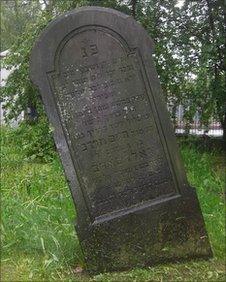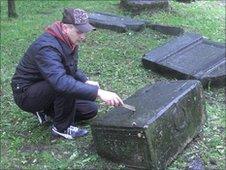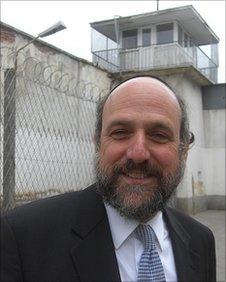Polish inmates help restore Jewish legacy
- Published

Poland's Jewish cemeteries are in a poor state of repair
Before World War II, Poland was home to about 3.5 million Jews, the largest Jewish community in Europe.
Some 90% of them were murdered by the Nazis during the Holocaust. Today there are only a few thousand Jews left in Poland to look after the country's 1,400-or-so Jewish cemeteries, most of which are overgrown or in ruins.
But now prisoners have volunteered to take part in a nationwide programme organised by the prison service and the Foundation for the Preservation of Jewish Heritage in Poland.
"Our main aim is to preserve some elements of Jewish culture in Poland," says prison service spokesman, Nikodem Banas.
"There are some side benefits of course," he added.
"It gets the prisoners used to working and it helps destroy the stereotypes which still exist in Polish and Israeli culture. Thanks to this programme anti-Semitism can be defeated and the prisoners can learn a lot about Jews."
Anti-Semitic incidents are on the decline in Poland, but the country has a reputation for being hostile to Jews.
It largely stems from the war when the Nazis built many of their death camps in Poland and rewarded Poles financially to inform on their Jewish neighbours.
Some did, and there is even a slang word for it in Polish, "szmalcownik". But at the same time, more Poles are honoured by Israel for saving Jews during the war than any other nationality.
Anti-Semitism is still evident, however. At a recent football match supporters unveiled a huge banner with the words, "death to the crooked noses". The clubs involved have been punished and the fans responsible arrested.
'Changed attitude'
A dozen prisoners from Grodzisk Mazowiecki outside Warsaw, carrying wooden rakes and metal trowels, walk the short distance to the town's cemetery in the pouring rain.

Prisoners scraped moss from tombs in Grodzisk Mazowiecki
As they arrive, workers are cutting the overgrown grass and weeds. Decades of neglect are clearly visible. Gravestones, some dating back to the 1700s, stick out of the grass at precarious angles or lie broken on the ground.
It is hard to imagine now, but at one time 85% of the town's population was Jewish and the graveyard was seven times larger.
Small Jewish towns, or shtetls, were widespread across Poland and Eastern Europe before the war, but they were wiped out during the Holocaust.
The prisoners rake up the grass cuttings and scrape moss from the inscriptions on the headstones.
One of them, Artur Blinski, says the scheme has broadened his outlook towards his country's past.
"Until now I wasn't that interested," he says.
"This programme has changed my attitude towards Jewish culture and I've started to get interested in it. I had no idea about this culture and the more I learn the more interesting it becomes."
'Larger picture'
Dressed in his striped prayer shawl, Poland's chief rabbi, Michael Schudrich, is answering questions from about 50 green-uniformed prisoners in Siedlce, in eastern Poland.
One asks whether rabbis can be married, while another wants to know which year it is in the Hebrew calendar.
The rabbi is visiting prisons across the country to talk about Jewish culture before they start the physical work in the cemeteries.

Rabbi Michael Schudrich has been touring Polish prisons
Discussions like this have only been possible in Poland for the last 20 years because under communism and its doctrine of atheism, talking about anything Jewish was taboo.
Rabbi Schudrich says now, many Poles, not just prisoners, find Jewish culture interesting and are exploring it in this climate of freedom.
"It's not only interesting, it's also a realisation among the non-Jewish Poles that Jews have been an important part of their civilisation, contribution to culture, to the history of Poland," he says.
"This interest in trying to preserve cemeteries today is part of a larger picture of Poles understanding now the role that Jews played for nearly 1,000 years in this country."
That picture can clearly be seen in Warsaw's synagogue where a choir is rehearsing songs in Hebrew and Yiddish, the language spoken by most Polish Jews before the war.
Most of the choir members, like Marta Wesolowska, are not Jewish but they feel a special connection to the music.
"I think this is really quite exotic for us but very deeply rooted in the Polish tradition," she says.
"Jewish music was a part of Polish culture for hundreds of years and after the Second World War it was destroyed and we try to revive this tradition."
Poland's Jewish community was devastated by the Holocaust.
But increasingly, a new generation of Poles are helping the few Jews who remain to ensure the country's rich Jewish legacy endures.